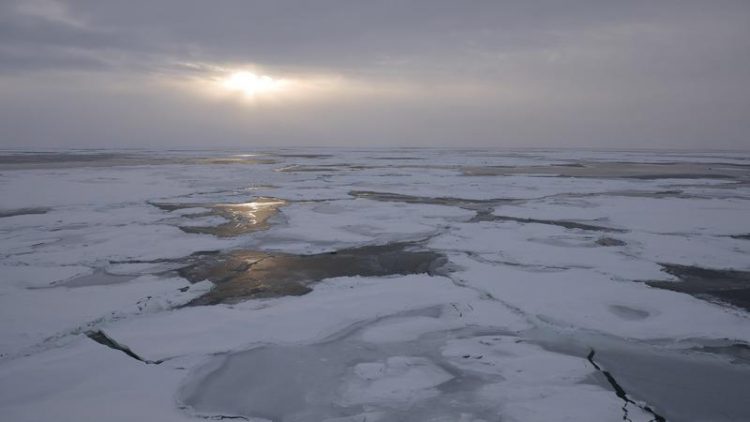Cause for variability in Arctic sea ice clarified

Arctic sea ice D. Olonscheck
“We know that the Arctic sea ice is declining more and more because we humans are warming the Earth by emitting greenhouse gases. But it has so far been unclear why in addition to this long-term decline the Arctic sea ice fluctuates so strongly from one year to the next,” says first author Dirk Olonscheck.
Previous studies assumed that self-amplifying processes, such as the increased reflectivity of bright ice compared to dark ocean water (the so-called ice-albedo feedback), are primarily responsible for the strong variability of the sea ice.
In contrast to these assumptions, the new study shows that the ice-albedo-feedback and other amplifying processes are only of minor importance for the interannual sea-ice variability.
“The main cause for the sea-ice variability are fluctuations in the amount of heat in the atmosphere transported into the Arctic, where it leads to sea ice melt. We have now been able to demonstrate that this link exists in all climate models and also in observational data,” states Dirk Olonscheck.
The results of the study imply on the one hand that the cause of interannual fluctuations in sea ice are easier to understand than previously thought, since complex atmospheric and oceanic processes within the Arctic are negligible.
On the other hand, the results also imply that it will hardly be possible to reliably predict the extent of the Arctic sea ice from one year to the next. Dirk Olonscheck:
“To do so, we would have to be able to predict the atmospheric heat transport into the Arctic, which depends on the highly chaotic weather.”
Dr Dirk Olonscheck
Max Planck Institute for Meteorology
Phone: +49 (0)40 41173 205
Email: dirk.olonscheck@mpimet.mpg.de
Prof Dr Thorsten Mauritsen
University Stockholm, Department of Meteorology
Phone: +46 (0) 8 164358
Email: Thorsten.mauritsen@misu.su.se
Dr Dirk Notz
Max Planck Institute for Meteorology
Phone: +49 (0)40 41173 163
Email: dirk.notz@mpimet.mpg.de
Olonscheck, D., T. Mauritsen and D. Notz (2019) Arctic sea-ice variability is primarily driven by atmospheric temperature fluctuations. Nature Geoscience, doi:10.1038/s41561-019-0363-1
Media Contact
More Information:
http://www.mpimet.mpg.de/All latest news from the category: Earth Sciences
Earth Sciences (also referred to as Geosciences), which deals with basic issues surrounding our planet, plays a vital role in the area of energy and raw materials supply.
Earth Sciences comprises subjects such as geology, geography, geological informatics, paleontology, mineralogy, petrography, crystallography, geophysics, geodesy, glaciology, cartography, photogrammetry, meteorology and seismology, early-warning systems, earthquake research and polar research.
Newest articles

Superradiant atoms could push the boundaries of how precisely time can be measured
Superradiant atoms can help us measure time more precisely than ever. In a new study, researchers from the University of Copenhagen present a new method for measuring the time interval,…

Ion thermoelectric conversion devices for near room temperature
The electrode sheet of the thermoelectric device consists of ionic hydrogel, which is sandwiched between the electrodes to form, and the Prussian blue on the electrode undergoes a redox reaction…

Zap Energy achieves 37-million-degree temperatures in a compact device
New publication reports record electron temperatures for a small-scale, sheared-flow-stabilized Z-pinch fusion device. In the nine decades since humans first produced fusion reactions, only a few fusion technologies have demonstrated…





















